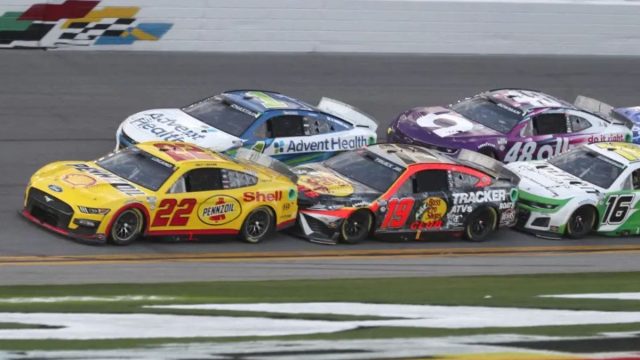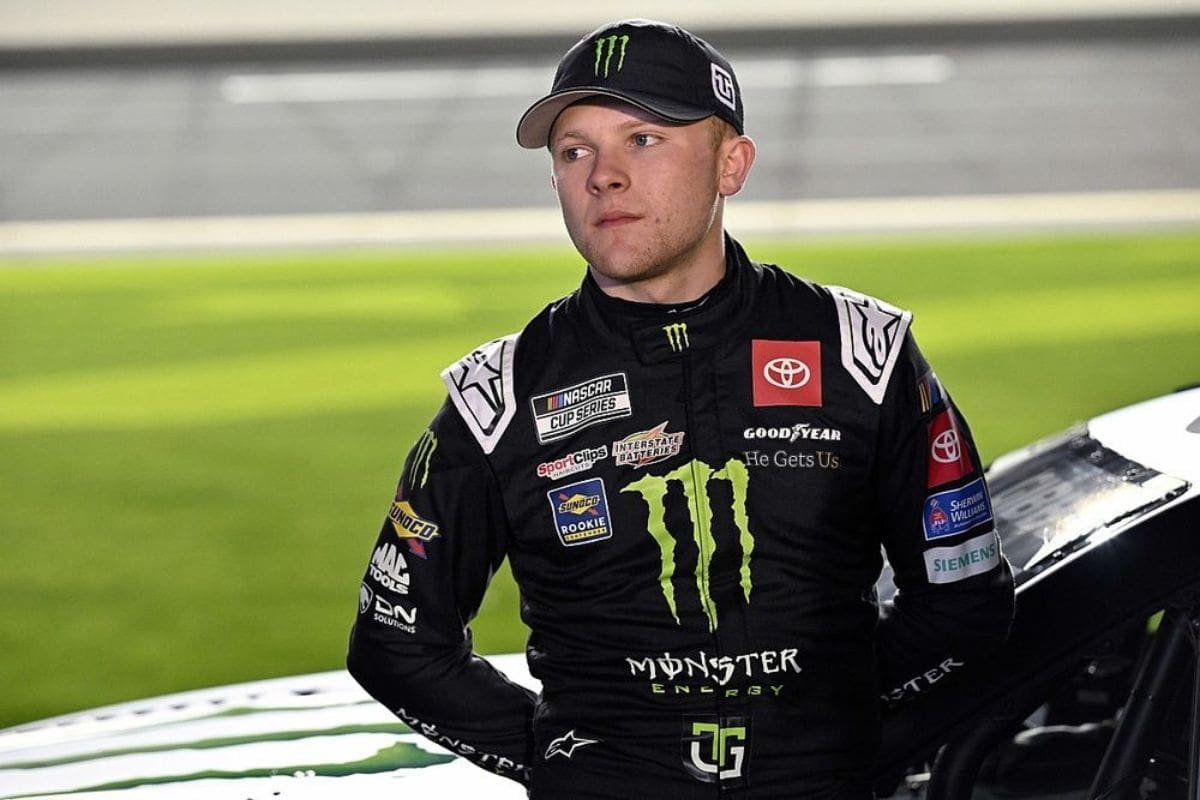NASCAR Playoff Battle Heats Up: As the NASCAR playoff landscape becomes increasingly competitive, the strain mounts for drivers seeking a pathway to postseason glory. Significantly, the consequences of recent races, such as the Michigan showdown, have reshaped the standings, leaving established contenders like Martin Truex Jr. and emerging talents like Ty Gibbs in precarious positions. With only a handful of races remaining, the interplay of strategy, skill, and sheer luck will determine who secures a coveted playoff spot. Which drivers will rise to the occasion and which will falter under strain? The answers could redefine the championship narrative this season.
Key Highlights
- Winning drivers currently occupy twelve playoff spots, leaving four positions available for non-winners to compete for entry.
- Martin Truex Jr. is comfortably above the cutline, while Ty Gibbs and Chris Buescher are also in strong positions.
- Ross Chastain’s recent struggles have tightened the competition, with him just one point ahead of Bubba Wallace.
- Strategic planning and adaptability are essential for drivers to secure points in the remaining races.
- Confidence and resilience are crucial; recent performances can significantly impact a driver’s playoff trajectory.
Playoff Picture Overview
As the NASCAR regular season draws to a close, the playoff picture is becoming increasingly defined, yet still fraught with tension. With only two races remaining before the postseason begins, the stakes have never been greater. Currently, twelve of the sixteen playoff spots are occupied by drivers who have secured wins, leaving just four coveted positions available for those vying for a chance at the championship.
At the forefront of this battle are Martin Truex Jr., Ty Gibbs, Chris Buescher, and Ross Chastain, who currently hold the last playoff positions. Truex Jr.’s comfortable margin of 77 points above the cutline places him in a secure position, but the others face a more precarious situation.
Ty Gibbs and Chris Buescher are just 39 and 16 points above the cutline, respectively, while Ross Chastain finds himself merely one point ahead of the initial driver outside the playoff picture, Bubba Wallace. This razor-thin margin highlights the intense stakes that Daytona International Speedway and the Darlington race will hold for these competitors.
As the tension mounts, the remaining eligible drivers must exhibit exceptional performance; they can either clinch their spots by winning or risk elimination. The intensity of the upcoming races promises to deliver thrilling action, as every lap becomes critical for those seeking to secure their place in NASCAR’s coveted postseason.
Impact of Michigan Race on Contenders
The Michigan race served as a pivotal moment for contenders in the NASCAR playoff battle, greatly impacting their standings and strategies heading into the final races. For drivers like Ross Chastain, the stakes were particularly high, as his performance at Michigan exemplified the volatility that can characterize this stage of the season.
Chastain was running in 11th place when disaster struck; a spin on the backstretch, triggered by the chaos following Alex Bowman’s wall contact, caused him to plummet to a disappointing 25th place finish. This incident cost him 14 vital points, a notable blow as he vies for a playoff position.
“I saw the same thing, I don’t know why we spun.” – Chastain
Chastain’s misfortune reflects a broader theme in the playoff race—one where even a single misstep can alter the path of a driver’s postseason ambitions. The unpredictability of the Michigan race not only reshaped the leaderboard but also forced contenders to recalibrate their strategies.
As drivers assess their performance, they must weigh the risks of aggressive driving against the need to secure points. In this tightly contested environment, every point counts, and incidents like Chastain’s can reverberate through the standings, influencing how drivers approach upcoming races.
For contenders like Christopher Bell and Brad Keselowski, maintaining consistency and avoiding mistakes will be paramount as they seek to secure their playoff spots. The Michigan race has set the stage for an intense final stretch, where strategy, precision, and sometimes sheer luck will determine who advances in the NASCAR playoffs.
Accidents and Setbacks
Frequently, accidents and setbacks can dramatically reshape the dynamics of a race, as evidenced by the recent Michigan event. In a crucial turning point, Kyle Larson’s spin in traffic initiated a chain reaction that ensnared both Bubba Wallace and Chris Buescher.
Wallace, who collided with the wall and Larson, faced considerable setbacks, ultimately finishing in 26th place. Despite the disappointment, he maintained a resilient outlook, stating, “Two races left, we’re still in the game, so throw Michigan away and on to Daytona.” His assessment emphasizes the psychological fortitude required in NASCAR, as drivers must quickly shift their focus from setbacks to future opportunities.
Conversely, Buescher exemplified the tenacity needed to navigate the aftermath of such incidents, recovering to secure a commendable sixth-place finish. This contrast highlights a crucial aspect of racing: the ability to adapt and overcome challenges. While Wallace’s car was compromised, Buescher’s resilience allowed him to capitalize on the misfortunes of others.
The implications of these accidents extend beyond individual performances, influencing playoff standings and team morale as the postseason looms. With only two races remaining, the stakes are higher than ever.
Drivers must not only contend with the physical demands of the sport but also manage the psychological toll of unexpected setbacks. As the competition intensifies, the ability to rebound from adversity will prove essential in securing a coveted playoff position.
The narrative of resilience in the face of accidents will certainly shape the upcoming races, making each event crucial in the quest for championship glory.
Buescher’s Strategy
Navigating the complexities of race strategy, Chris Buescher exhibited a keen understanding of the balance between aggression and caution in the recent NASCAR events. His approach reflects a sophisticated grasp of the intricacies involved in securing a playoff spot, particularly when the opportunity to clinch a race victory has eluded him. Buescher’s commentary highlights his mindset: “We are not points racers…but when our chance to win this thing was gone, ultimately that was some of the mentality.” This duality—maintaining a competitive edge while being methodical—was critical in his recent performances.
“I am adamant that we are not points racers but when our chance to win this thing was gone, ultimately that was some of the mentality, to figure out how to make the best of our day.”
“We had seen troubles from some of the other cars that were on the bubble. I wouldn’t say we weren’t aggressive on restarts, though. We were moving, but we were also trying to be smart and methodical about it and not put ourselves in a really bad spot. It was on our mind there at the end. It is what you have to do once you aren’t in contention to win the race.” – Buescher
Ultimately, Buescher’s approach exemplifies a tactical mindset aimed at maximizing outcomes under strain. While he remained competitive, he also recognized the importance of smart racing, avoiding unnecessary risks that could jeopardize his playoff ambitions. As the season progresses, Buescher’s ability to navigate this delicate balance will be essential in his quest for a coveted playoff berth.
Gibbs’ Performance and Optimism
Although challenges have afflicted his recent performances, Ty Gibbs emerged with renewed optimism following a strong showing at Michigan. Finishing third marked only his second top-10 finish in the last ten races, yet it was a crucial moment that could greatly change the course of his playoff campaign. Entering Michigan 18 points above the cutline, Gibbs not only maintained his position but improved it through a tactical approach orchestrated by crew chief Chris Gayle.
“The more you have trouble — you don’t get the finish — human nature is to assume that’s going to continue to happen until you break it.” – Gayle
Gibbs’s performance at Michigan was characterized by consistency and tactical execution, scoring valuable points in the second stage. The 42 points he amassed were particularly remarkable, as they matched the total he had accrued over the previous three races combined. This striking contrast highlights a potential turning point for Gibbs and his team, suggesting that their earlier struggles might be on the verge of being overturned.
Gayle’s insights post-race reveal an understanding of the psychological aspects of racing. He noted that repeated setbacks can foster self-doubt but emphasized that successful outings, such as Michigan, can rekindle confidence.
“So, I think what has to happen is days like (Monday) reinstall some confidence that OK it’s not just rhetoric, we’re doing more like we can do it, even with a rain out in qualifying and starting (19th), we can get there. So, OK, now I’ve got a little more hope for the next time. Then you have to put the next race together (and) next race and that’s how you start the streak the other way.” – Gayle
By overcoming the adversity of starting 19th due to a rainout in qualifying, Gibbs showcased resilience and adaptability—qualities vital for sustaining momentum in the playoffs.
As Gibbs and his team look ahead, the challenge remains to replicate this strong performance consistently. With optimism revitalized, they must utilize this newfound confidence to forge a path toward playoff success, transforming potential into results.
News in Brief: NASCAR Playoff Battle Heats Up
As the NASCAR playoff landscape shifts, the competition becomes increasingly fierce. Key performances, tactical decisions, and the potential for unforeseen incidents will ultimately determine which drivers secure their playoff berths. The outcomes of upcoming races will greatly influence the standings, amplifying the strain on both established and emerging contenders. With the stakes at an all-time high, the unfolding drama of the NASCAR season promises to captivate fans and maintain the intensity of the playoff battle.
ALSO READ: NASCAR Michigan’s Wild Triple Flat Tire Drama: Joey Logano, Todd Gilliland, A.J Allmendinger in Chaos



